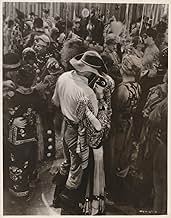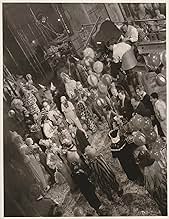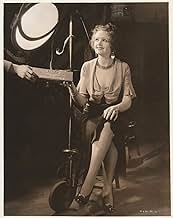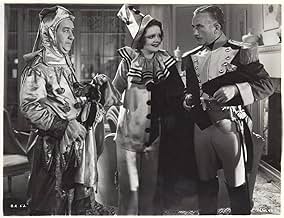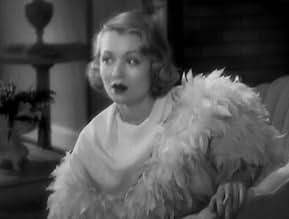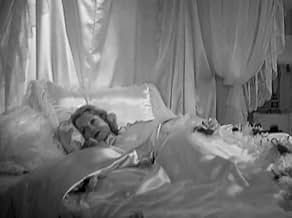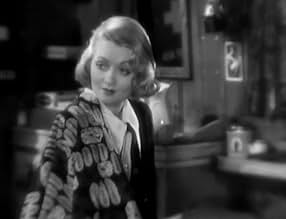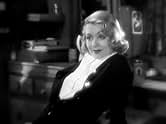VALUTAZIONE IMDb
6,4/10
1155
LA TUA VALUTAZIONE
Aggiungi una trama nella tua linguaDetermined to reform upon leaving prison, a former prostitute falls in love with a cotton-barge owner and must choose between him and her banker lover.Determined to reform upon leaving prison, a former prostitute falls in love with a cotton-barge owner and must choose between him and her banker lover.Determined to reform upon leaving prison, a former prostitute falls in love with a cotton-barge owner and must choose between him and her banker lover.
- Regia
- Sceneggiatura
- Star
Samuel S. Hinds
- Father Doran
- (as Samuel Hinds)
Tom Herbert
- Salesman Ogelthorpe
- (as Tom Francis)
Wade Boteler
- River Boat Purser
- (non citato nei titoli originali)
Eddy Chandler
- River Boat Steward
- (non citato nei titoli originali)
Jane Darwell
- Mrs. Webster - Head Prison Matron
- (non citato nei titoli originali)
Arthur Hoyt
- Hoyt - Paige's Secretary
- (non citato nei titoli originali)
John Larkin
- Man Meeting Released Prisoner
- (non citato nei titoli originali)
Matt McHugh
- Mr. Jones
- (non citato nei titoli originali)
Robert Emmett O'Connor
- River Boat Captain Scroggins
- (non citato nei titoli originali)
Eileen Percy
- Woman
- (partecipazione non confermata)
- (non citato nei titoli originali)
George Reed
- Alice - Dan's Shipboard Cook
- (non citato nei titoli originali)
Mildred Washington
- Genevieve - Lorry's Maid
- (non citato nei titoli originali)
Recensioni in evidenza
A witty vehicle for the beautiful Constance Bennett, this has dialogue that seems to aspire to that of Noel Coward.
Bennett and the delightful Pert Kelton leave prison at the same time. (Later, Bennett refers to Kelton as her roommate from convent. One wonders if Patrick Dennis was inspired by this when he had Belle Poitrine describe her reform school friend Winnie as a friend from boarding school. This occurs in "Little Me," one of the most hilarious books ever written and surely, 40 years or more after its publication, a dead-on commentary on movie star autobiographies.) Bernnett finds herself a nice sugar daddy in John Halliday. He sets her up in some swank apartment, let me tell you! Alas, she meets Joel McCrea, here the owner of a fishing boat. He looks bony here -- but as gorgeous a man as ever graced the screen. His only equal was Gary Cooper around this time.
Bennett falls for him and is willing to dump her riches to take to the sea with him -- as who in his or her right mind would not have. These plans are thwarted by jealous Halliday. But after a Mardi Gras sequence that doesn't entirely work, all ends happily -- at least for our two beautiful stars.
Bennett and the delightful Pert Kelton leave prison at the same time. (Later, Bennett refers to Kelton as her roommate from convent. One wonders if Patrick Dennis was inspired by this when he had Belle Poitrine describe her reform school friend Winnie as a friend from boarding school. This occurs in "Little Me," one of the most hilarious books ever written and surely, 40 years or more after its publication, a dead-on commentary on movie star autobiographies.) Bernnett finds herself a nice sugar daddy in John Halliday. He sets her up in some swank apartment, let me tell you! Alas, she meets Joel McCrea, here the owner of a fishing boat. He looks bony here -- but as gorgeous a man as ever graced the screen. His only equal was Gary Cooper around this time.
Bennett falls for him and is willing to dump her riches to take to the sea with him -- as who in his or her right mind would not have. These plans are thwarted by jealous Halliday. But after a Mardi Gras sequence that doesn't entirely work, all ends happily -- at least for our two beautiful stars.
This is a superbly engrossing melodrama with a hard-hitting edge presented in an accessible, non-confrontational style.
Like a lot of early thirties pictures, the theme this deals with is the pitiful and frighteningly awful lack of opportunities young, poor women had back then. It's not as shocking as Loretta Young's SHE HAD TO SAY YES (actually an even better film) which left you with the jaw-dropping realisation of what times were really like but nevertheless it still destroys any false preconceptions that gold diggers or prostitutes did that out of choice.
In a challenging role, Constance makes her character difficult to like at the start. Her task is to try to get the get the audience on her side which she achieves effortlessly. She mainly played heiresses or glamorous romantic heroines so this was a bit of a departure for her but any worries that she'd not be able to convey a low-life, hard boiled amoral girl from the wrong side of the tracks were instantly dispelled. (She does a million times better at this than her sister did in the terrible ME AND MY GAL) I wonder if this character was a man would the audience be so easily swayed - but of course what made this person so unpleasant was specifically because she wasn't a man: she had had to survive in that brutal society in the only way she knew how.
Director Gregory la Cava never lets your attention slip for a minute, makes it lovely to look at and plays a lot with symbolism. It's interesting to compare how different Constance Bennett's character behaves depending on what sort of room she is in particularly in the prison cell or the ill-gotten opulent suite, her self-made prison cell.
Overall it's a fabulous insight into how life had to be lived in the early thirties. It's directed with energy and fun so although it's all serious stuff, it still feels funny. Constance Bennett is surprisingly brilliant, she gained her fame from her looks but this proves that she's wasn't just a pretty face. She carries this whole film herself so how good the rest of the cast are doesn't really matter - although you do get a little irritated by Pert Kelton's annoying Mae West impersonation.
Like a lot of early thirties pictures, the theme this deals with is the pitiful and frighteningly awful lack of opportunities young, poor women had back then. It's not as shocking as Loretta Young's SHE HAD TO SAY YES (actually an even better film) which left you with the jaw-dropping realisation of what times were really like but nevertheless it still destroys any false preconceptions that gold diggers or prostitutes did that out of choice.
In a challenging role, Constance makes her character difficult to like at the start. Her task is to try to get the get the audience on her side which she achieves effortlessly. She mainly played heiresses or glamorous romantic heroines so this was a bit of a departure for her but any worries that she'd not be able to convey a low-life, hard boiled amoral girl from the wrong side of the tracks were instantly dispelled. (She does a million times better at this than her sister did in the terrible ME AND MY GAL) I wonder if this character was a man would the audience be so easily swayed - but of course what made this person so unpleasant was specifically because she wasn't a man: she had had to survive in that brutal society in the only way she knew how.
Director Gregory la Cava never lets your attention slip for a minute, makes it lovely to look at and plays a lot with symbolism. It's interesting to compare how different Constance Bennett's character behaves depending on what sort of room she is in particularly in the prison cell or the ill-gotten opulent suite, her self-made prison cell.
Overall it's a fabulous insight into how life had to be lived in the early thirties. It's directed with energy and fun so although it's all serious stuff, it still feels funny. Constance Bennett is surprisingly brilliant, she gained her fame from her looks but this proves that she's wasn't just a pretty face. She carries this whole film herself so how good the rest of the cast are doesn't really matter - although you do get a little irritated by Pert Kelton's annoying Mae West impersonation.
Constance Bennett and pal Pat Kelton get out of prison and will do anything--ANYTHING--to get a man with cash. Bennett eventually falls in love with poor Joel McCrea--but will she be able to tell him about her past?
Nothing new story wise but some of the dialogue and situations are pretty frank for 1933. It's made quite clear that Bennett and Kelton have, and will, sleep with men for money. Also one woman is very obviously a kept woman. Very much a pre-Code film.
The dialogue is sharp, funny, fast and racy. All the acting is great--Bennett is just beautiful, McCrea is young, hunky and handsome and Kelton is hysterical doing a Mae West imitation.
Quick (67 minutes) and worth catching.
Nothing new story wise but some of the dialogue and situations are pretty frank for 1933. It's made quite clear that Bennett and Kelton have, and will, sleep with men for money. Also one woman is very obviously a kept woman. Very much a pre-Code film.
The dialogue is sharp, funny, fast and racy. All the acting is great--Bennett is just beautiful, McCrea is young, hunky and handsome and Kelton is hysterical doing a Mae West imitation.
Quick (67 minutes) and worth catching.
I have watched many movies of the 1930's and I think I can make the following statement in clear conscience: the first 15 minutes of 1933's "Bed of Roses" is the dirtiest sequence of main stream film to grace the screen for the next 25 years! Wow, it is awesome. The great Constance Bennett, and her hooker partner Minnie, both just out of jail, need a ride to New Orleans. Minnie cozies up to a truck driver, asks for a ride, he says "what's your offer?" Then, a minute later, Bennett sidles up, and Minnie asks her, "can you drive?"! Implied yet relatively explicit is the suggestion that Minnie will be "paying off" the driver in the back of the truck! Wow! Then, once on the riverboat, the two girls are short of cash, so Minnie quite obviously whispers a rude offer into the steward's ear. He rejects the offer, but she doesn't mind - "nothing personal" she declaims. Judy Garland never behaved this way with Mickey Rooney over at MGM!
Folks, I am ever-grateful that the "Code" forced Hollywood to keep its movies very clean for 2 or 3 decades: the art of that period will never be surpassed again. But taking this path makes all those slightly naughty movies of the early 30's that much more fascinating and wonderful to see, like they got away with something, and we are the beneficiaries of that daring.
Another interesting decision the director makes is to take about 15 minutes worth of early action, which takes place on the Mississippi River, and have it all occur in a quite heavy fog. The hazy sheen in which the actors perform is noteworthy for how long this goes on for. Again, daring and interesting.
Constance Bennett is fantastically seductive, cynical, world-weary and manipulative. Joel McCrea is great being himself. And Samuel Hinds, one of my favorite minor character actors, with his perpetually silvery hair, is his usual fatherly best.
A great one from the early days, not to be missed, even if not one of the characters has a Louisiana accent.
Folks, I am ever-grateful that the "Code" forced Hollywood to keep its movies very clean for 2 or 3 decades: the art of that period will never be surpassed again. But taking this path makes all those slightly naughty movies of the early 30's that much more fascinating and wonderful to see, like they got away with something, and we are the beneficiaries of that daring.
Another interesting decision the director makes is to take about 15 minutes worth of early action, which takes place on the Mississippi River, and have it all occur in a quite heavy fog. The hazy sheen in which the actors perform is noteworthy for how long this goes on for. Again, daring and interesting.
Constance Bennett is fantastically seductive, cynical, world-weary and manipulative. Joel McCrea is great being himself. And Samuel Hinds, one of my favorite minor character actors, with his perpetually silvery hair, is his usual fatherly best.
A great one from the early days, not to be missed, even if not one of the characters has a Louisiana accent.
Snappy comedy drama. With all the biting dialogue and crusty dames, I kept thinking '30's Warner Bros. but it's RKO on a Warner's trip. Bennet and Kelton are a couple of hookers on probation looking for a way to get by. So guess what, Bennet meets sugar daddy Halliday who sets her up in comfort after initial misgivings (she probably applied her professional know-how). So it's now a bed of roses except that she can't get over cotton barge captain McCrea. Trouble is he's a straight shooter who might reject her if he finds out about her past. So what's she to do-- stay with sugar daddy or follow her heart and risk rejection. And will Kelton's presence help since she's a constant reminder.
All in all, it's a little gem, with sassy Kelton providing spark. Some of the lines are knee-slappers, like the guy who tells the girl he's a boll-weevil exterminator to which she replies, "I ain't done nothin' ". Mc Crea may get top male billing, but it's really Halliday getting the screentime. Note too how the screenplay finesses prostitution even though 1933 is still pre-Code. And that's along with cracks about Prohibition, which was about to end its 13-dry years. Anyway, thanks to the writers including underrated director La Cava, it's a nifty programmer of the sort old movie fans love to stumble across. I know I did.
All in all, it's a little gem, with sassy Kelton providing spark. Some of the lines are knee-slappers, like the guy who tells the girl he's a boll-weevil exterminator to which she replies, "I ain't done nothin' ". Mc Crea may get top male billing, but it's really Halliday getting the screentime. Note too how the screenplay finesses prostitution even though 1933 is still pre-Code. And that's along with cracks about Prohibition, which was about to end its 13-dry years. Anyway, thanks to the writers including underrated director La Cava, it's a nifty programmer of the sort old movie fans love to stumble across. I know I did.
Lo sapevi?
- QuizThe last of four films co-starring Constance Bennett and Joel McCrea, along with Passione di mamma (1931), The Common Law (1931), and Labbra proibite (1932).
- BlooperWhen Lorry is in her room on the steamboat, there is a fur coat on the top bunker resting up against the bedpost. On the following cuts, the orientation of the coat keeps changing. The matching hat on the top bunker also changes orientation.
- Citazioni
Mrs. Webster - Head Prison Matron: As Head Matron of his Institution, in all my experience, I have never come...
Lorry Evans: Save your wind, save your wind, you might want to go sailing sometime.
- Colonne sonoreYou're the Flower of My Heart, Sweet Adeline
(1903) (uncredited)
Music by Harry Armstrong
Lyric by Richard H. Gerard
Sung a cappella and offscreen by Matt McHugh and Pert Kelton
I più visti
Accedi per valutare e creare un elenco di titoli salvati per ottenere consigli personalizzati
Dettagli
- Data di uscita
- Paese di origine
- Lingua
- Celebre anche come
- Letto di rose
- Luoghi delle riprese
- Azienda produttrice
- Vedi altri crediti dell’azienda su IMDbPro
- Tempo di esecuzione1 ora 7 minuti
- Colore
- Proporzioni
- 1.37 : 1
Contribuisci a questa pagina
Suggerisci una modifica o aggiungi i contenuti mancanti

